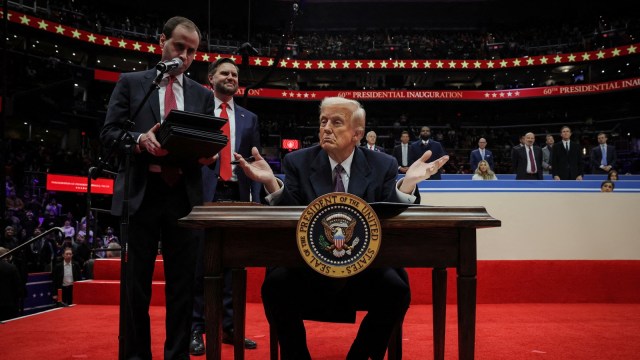Stay updated with the latest - Click here to follow us on Instagram
Is Donald Trump’s order on US birthright citizenship retroactive? Who will it impact? All your questions answered
Donald Trump's Birthright Citizenship Order: What it means and who it affects
 US President Donald Trump gestures after signing executive orders on his inauguration day on January 20, 2025. (Reuters)
US President Donald Trump gestures after signing executive orders on his inauguration day on January 20, 2025. (Reuters)Understanding the Impact of Donald Trump’s Order on US Birthright Citizenship: Shortly after US President Donald Trump signed an executive order revoking birthright citizenship for immigrants, several social media users questioned the status of Usha Vance, wife of Vice-President J D Vance.
Usha was born in 1986 to Hindu parents who moved to the US in the late 1970s. Will Trump’s order that blocks automatic citizenship for children of non-citizens and unlawful residents in the United States impact the status of Usha and many like her?
The simple answer is no. The immigration status of Usha’s parents – not in the public domain – would have no bearing on Usha’s citizenship. The executive order signed by Trump will not work retroactively, that is, it will not impact those who were granted citizenship before the signing of the executive order.
The rule will apply “only to persons who are born within the United States after 30 days from the date of this order,” the official order, signed on January 20, states.
So, who will the order impact?
Trump’s order states that a child born to a mother, who is unlawfully or temporarily (but legally) in the US, and does not have a father, who is a citizen or lawful permanent resident of the country, will not be granted birthright citizenship.
This means that H-1B visa holders, temporary visa holders (such as students, tourists, temporary workers and those visiting family), and undocumented immigrants will be impacted by the order. It makes the future uncertain for those who are awaiting green cards (permanent residency), a process that can take years.
Legal challenges
Critics of the order argue that the rule would violate the provisions of the American Constitution.
Does it? Well, the 14th Amendment to the US Constitution reads, “All persons born or naturalized in the United States, and subject to the jurisdiction thereof, are citizens of the United States and of the State wherein they reside.”
There are different interpretations of the phrase “subject to the jurisdiction thereof”. Trump’s order implies that children of those in the US illegally or temporarily do come under the provisions of the 14th Amendment. “The Fourteenth Amendment has never been interpreted to extend citizenship universally to everyone born within the United States,” the text of the executive order reads.
However, as many as 22 Democratic states and civil rights unions have already moved the court to block Trump’s agenda.
What happens next?
The courts may have the final say. If they rule in favour of the petitioners, Trump would have to effect a constitutional amendment which requires a two-thirds majority in both Houses and approval by three-quarters of state legislatures.



- 01
- 02
- 03
- 04
- 05




























